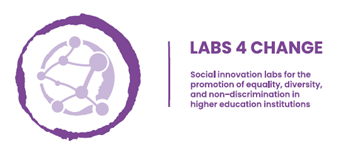Labs4Change - Social Innovation Labs for the promotion of equality, diversity, and non-discrimination in Higher Education Institutions
09/01/2024 - 08/31/2026
Research area Innovation and education in the digital society | Dr. Karina Maldonado-Mariscal | Clara Behrend
Labs4Change is an Erasmus+ project focusing on cooperation partnerships in higher education. It was officially launched on 1 September 2024 and will run until 31 August 2026, co-funded by the European Union. The project brings together renowned organisations from Spain, Greece and Germany to develop and test innovative tools and frameworks that address systemic inequalities and enhance inclusivity in higher education.
In recent years, there has been a growing recognition of the importance of addressing equality and diversity in higher education institutions, particularly through the lens of intersectionality. Coined by Kimberlé Crenshaw, intersectionality has become a fundamental concept in understanding and addressing the complex layers of discrimination and inequality that individuals face in various settings, including universities (Claeys-Kulik et al., 2019). This approach examines how different forms of discrimination, such as racism, sexism and classism, interact with each other and affect individuals in unique ways (Kantola & Nousiainen, 2009). This means that there is no simple solution to this challenge; an inclusive approach to diversity based on social justice is required, rather than an approach that focuses exclusively on assessing outcomes related to employability or graduation rates.
This is the context in which the Labs4Change: Social Innovation Labs for the Promotion of Equality, Diversity, and Non-Discrimination in Higher Education Institutions project was created. It brings together organisations with a solid track record in social innovation and a strong commitment to equality.
The three universities of the consortium – University of Thessaly, Mondragón University and TU Dortmund - will implement trainings for teaching staff, a student academy and living labs to find solutions to combat inequality and discrimination building on existing institutions and initiatives. Bringing together students, teaching staff, interest group representatives and other experts of the local networks, local challenges are going to be identified and solutions are going to be developed. Additionally, a continuous exchange among the different universities but also among the different experts identified in the ecosystems of the three universities will allow for a transfer of knowledge and experiences.
- Mondragon Unibertsitatea – (MU) – Spain (coordinator): is a cooperative faculty of business studies that promotes learning-by-doing and learning-from-reality methodologies, empowering students to address real-world challenges through team entrepreneurship and social innovation.
- University of Thessaly – (Greece): with long achievements in participatory audits and the development of localized strategies for equity.
- TECHNISCHE UNIVERSITÄT DORTMUND (TUDO), Social Research Center (sfs) –Germany: Leaders in social innovation research and systemic change in their region.
- 2811 Social Enterprise UG – Germany: A consultancy firm specialized in training and empowering change agents.
- DINAMIA S. Coop. Mad. – Spain: A cooperative consultancy firm specializing in social economy and the design of impactful awareness strategies.
The project aims to achieve the following through a participatory approach:
- Establish Social Innovation Laboratories (Living Labs) within universities to co-create practical solutions for identified challenges.
- Develop an Interactive Online Academy and a webinar series offering training on gender-related topics to university staff, students, and stakeholders.
- Conduct Participatory Audits to identify discriminatory biases and recommend improvements within HEIs.
- Build a Network of Change Agents dedicated to promoting inclusive education across Europe.
Key Outcomes and Impact
- The creation of three Social Innovation Laboratories (Living Labs) in three universities dedicated to addressing local challenges through co-creation and collaboration.
- Implementation of pilot audits assessing institutional policies and practices related to gender and diversity.
- Development of ecosystem maps illustrating inequality and inclusion dynamics within universities and their communities.
- Formation of a network of local experts and stakeholders committed to fostering cultural change.
- Accessible resources and training tools that will be available through a Virtual Learning Platform.
Adopting a perspective on social innovation in education, this project involves social innovation laboratories, webinars, internal measurement and awareness-raising activities. The aim is to foster a more inclusive, diverse and non-discriminatory environment within higher education institutions. The primary function of the sfs (sozialforschungsstelle) is to co-create and implement social innovation laboratories.
LinkedIn
http://www.linkedin.com/in/labs4change-project-88921435a
Instagram
https://www.instagram.com/labs4changeaccount
Facebook
https://www.facebook.com/profile.php?id=61574788744354
For more information and collaboration inquiries, contact us at: labs4changemondragonedu (Sayuri Alvarado Tanamachi)
You can also reach some of our team members for specific inquiries:
- Academy and webinar series for staff, administration, and students: Malu Landaberea
- Social Innovation labs (Living labs) design and implementation: Karina Maldonado-Mariscal
- Design and implementation of an Audit tool: Ainhoa Pipaon




![[Translate to English:] [Translate to English:]](/storages/zentraler_bilderpool/_processed_/a/f/csm_Kontakt_b86e8d8ecc.png)
![[Translate to English:] [Translate to English:]](/storages/sfs-sowi/_processed_/6/c/csm_Glasfront_sfs_Header_eae6d325d3.jpg)

